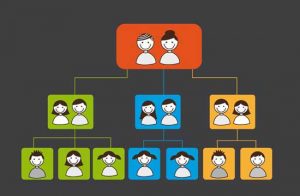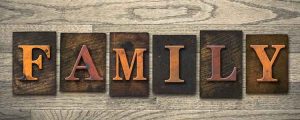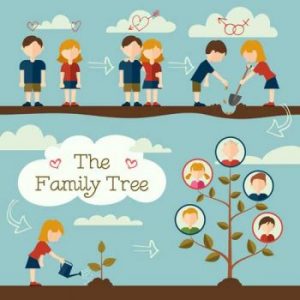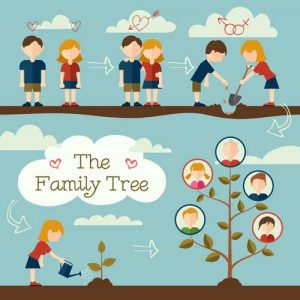December 21st is the date that the hotly anticipated Assassin’s Creed, the movie, is released.
Revolutionary technology unlocks his genetic memories allowing Callum Lynch, played by Michael Fassbender, to experience the adventures of his ancestor, Aguilar.
In 15th Century Spain, Callum discovers he descends from a mysterious secret society known as the Assassins. He acquires knowledge and skills to take on the oppressive, powerful Templar organisation in the present day.
It sounds far-fetched, a typical product of Hollywood special effects and the writer’s imagination, but genealogists have long understood that our ancestors from centuries past influence how we act and behave today.
Scientific basis
For anyone studying genealogy courses, they will come across personal stories that show the ups and downs of life.
They will trace their ancestors who will have lived through golden times, as well as turbulent ones. And it seems that there is a scientific basis for these good and bad times to affect the genes of those that lived through them, and any offspring from then on.
Callum Lynch travels back to the 15th Century, but the science has yet to prove anything beyond grandparents. But there is a very real impact on what your ancestors did and lived through on your genetic make-up today.
The science is still unfolding; especially in terms of human subjects, but there has been in-depth study of rats, specifically mother rats and their offspring.
The experiments are deceptively simple. Mother rats whose offspring was handled for five to fifteen minutes a day were better mothers. Their offspring were calmer with the mother rat more tactile, grooming them and allowing them more space to feed.
Mother rats whose offspring were not handled by humans seemed more distant from their offspring, indulging in what is known as arch-back parenting. They carried their babies on their backs and did not interact as they fed.
The genes had not changed but there was, as the leading geneticists have chosen to describe it, a fine powder sprinkled across the genes when the rats suffered from poor parenting. In humans, this ‘fine dust’ is known as methyl, an organic compound that sits external to DNA.
In the rat offspring nurtured, it wasn’t there. In the rats that were not treated well by their mother, it was. And when it was present, the rats were more reactive in certain situations – they were skittish around humans, unpleasant to one another and so on.
The human sample is small, but the results are similar. Studying the DNA for methyl attached to the DNA of 14 Russian orphan children compared to 14 children brought up by their biological parents showed a marked difference.
So, when we look back at our ancestors, the winning of the lottery by the parents of a two-year old child and that of a two-year old child whose parents were made bankrupt, will show a difference in the level of methyl on the DNA.
It seems that as our ancestors lived, like fine dust, everything that affected them, good or bad, did have an impact on their genes – which means that our genes are affected too.
All nature and no nurture?
There has long been a debate regarding nature vs. nurture. It seems that the science confirms that some behaviours are inherent to our genes, but psychologists say that with the right input, these negatives can be changed just as with the wrong input, people can become something else entirely.
But what does it mean for those studying genealogy courses?
It may mean that the stories of the past have a direct impact and influence on the people of today, something that we may have felt has always been the case, but there has been no science to prove it. But that could now become a reality.
Why study genealogy?
Genealogy courses open you to a whole new world. It is a chance not only to trace a family tree, but to delve deeper and find the personal stories within the feats, adventures and changes that societies and cultures have lived through.
These deeply personal stories of your ancestors will and do affect you today. The revolutions of the past do have an impact on how we react to challenges in the present day.
As well as using your newfound skills for yourself, you could also offer your services to other people, researching and finding the stories of their ancestors.
Perhaps there is some truth in Assassin’s Creed and the adventures of Callum Lynch in 15th Century Spain as he fights his modern-day foe?
Family history is a popular subject. Who wouldn’t, for example, want to know the stories of their ancestors, where they lived, what they did, the stories of family members gone past? TV programmes have also helped to fuel the popularity of looking into a family’s past, with some shocks along the way, as well as pleasant surprises.
Online genealogy courses are the perfect means by which to learning all the skills, abilities and gain the knowledge you need to delve deeply into your family’s past, finding ancestors not only in the UK but all over the world.
Why study for a genealogy qualification?
History can be confusing. The way records were made and kept a century ago is very different to how we keep them today. The language used, although English, can be confusing too. Did you know, for example, centuries ago that an ‘s’ was written as an ‘f’? If you didn’t know this, it could be difficult to decipher the information written before you and why your surname, for example, was written as ‘jones’!
Genealogy is an interesting topic, taking you back in time to when life could have been incredibly hard for your ancestors, as well as sprinkled with good fortune and great stories. Many people find it a long-term project and one that sees them pick up all kinds of skills. Some people go on to make a career out of it too, becoming a family historian and sleuth for other families.
Why study from home?
Think how busy your life is – work, family commitments, social times and hobbies… the list could go on and on. It can seem nigh on impossible to have one evening a week, or more, to attend a class at a local college. You may start with all the best intentions but, after a bad day at work, and when the weather is cold and evenings dark, you may not fancy going to college for your class. And so you miss a week, and then you miss another… and another.
But, if you study at home, it doesn’t matter if the weather is bad or good; it doesn’t matter if you have a good day at work or not because you can pick up your course materials as when you can, and like.

What is in your past? Find out with a Diploma in Genealogy.
For example, you may work best of an evening, when the kids are in bed or at least settled and watching TV, or you may be someone who would read a chapter of your course material in a morning, before the rest of the house wakes.
You study an online genealogy course when you can and when you want and, even better, you can study at your own pace. You may grasp a concept quickly and move on or, you may struggle with a theory or an idea, and choose to research this a little more before you move on.
It really is down to you and we think this discipline of self-managing your own learning is an important skill for any student to learning, a transferable skill and discipline which is excellent for when you are working on another project or in the workplace.
It can also be cheaper. NCC Home Learning are able to provide home study at a fraction of the cost of courses at some colleges, without compromising on the quality of the materials and the tutor support packages.
Online courses have the same value and quality to them as one taught in a class thus, studying at home, in your own time and at your own pace has never looked so good.
What can a genealogy course teach you?
The Diploma in Genealogy looks at the difference between family history and genealogy, an important difference when studying this topic. It also looks at how to access certain record types, such a census material and what the information is telling you.
It also examines the information contained on certificates, and why this information is important. It also looks as the significance of missing information; these gaps can tell us just as much about families and history as words and photographs.
The diploma also examines whether genealogy is a hobby or a career move, examining some of the professional standards of practice expected.
How to apply
Applying for online courses with NCC Home Learning is simple and straightforward. In most cases, you will not need to have prior knowledge or understanding of a topic but always check the detail of the course for any requirements.
You will need around 5 hours of study time a week, as a minimum although this does depend on your course. Some students study bit-by-bit, completing a small of part of a module on a daily basis whilst other students set a morning or even a whole day aside to concentrate fully on a module.
You can opt to pay in one lump sum or you can enrol online with a small deposit, continuing to pay monthly over six months. There is a full tutor support package for 12 months although if you feel you need more, you can opt to buy more.
Unlock your potential and achieve your goals with our comprehensive selection of online courses UK – designed to enhance your skills, boost your career prospects, and empower you to succeed in today’s competitive job market.
Genealogy, the practice of tracing family history and ancestry through the centuries, has piqued the curiosity of the British public.
Satisfying our curiosity and the need to know where we have come from, it is a process that fun and informative, as well as being one that throws the odd surprise into the mix too.
For many people, it is a hobby. It is something they do of an evening or a weekend, spending time researching online archives for traces of ancestors and stories.
But it can be much more than that. It can be the means by which people lay claim to land, property and estate.
Therefore, in looking at how to become a genealogist and filling in the gaps of a family tree, you need to be aware that it could lead you places you never thought, including a new career.Genealogy can be more than just creating a family tree…
- Gaining and using experience – with so many projects and tasks these days, when we want to know something, we use a search engine. There are organisations, archives and so on that are in the process of adding records to their online libraries, a great way of finding information. But sometimes, you will need to dig deeper, possibly travelling to libraries and archives across the country. Some professional genealogists will travel the world in search of the information they need. You will gain so many new researching and information-finding techniques, other than searching the web.
- Literature of old – the way we keep records has changed over the years, especially the language used in such documents. For example, in handwritten script from centuries ago, an ‘s’ would often be written as ‘f’, a small piece of information that can make deciphering a document so much easier.

- Volunteer on projects – if you are interested in such projects, volunteering on local projects can be a great way of gaining valuable experience, skills and knowledge. These projects will often look at how a town has flourished from a tiny village, to a throbbing city – and somewhere in that mix could be your ancestors.
- Educate yourself – from subscribing to professional journals, to taking courses of all kinds, including how to work in an archive, where to find information and how to look, etc.; there are so many points of interest to genealogy that taking one course will no doubt lead to others.
- Not just family-based research – genealogy is not just about family trees and ancestors. Professional genealogists work as authors, teachers, lecturers as well as offering their services to all kinds of professions, including the legal profession and so on.
Start your genealogy journey online
And by this, we don’t just mean typing in your surname to see what it means or where it came from. Online genealogy courses are the perfect way to start your journey, acquiring the basic  skills you need to start researching your own family history, as well as possibly leading to a new career.
skills you need to start researching your own family history, as well as possibly leading to a new career.
Studying online has many benefits;
- No need to become cash-strapped – at one time, acquiring new skills meant giving up work and sitting in a classroom all day. No longer is this the case as studying from home is the perfect option. Study when you want and when you can, and still be able to pay the bills every month.
- High quality and great value – you may think that some online study courses are a little vague or a light-tough course. You may be surprised to find that many online course, including those that show you how to become a genealogist are of the same value and quality as those taught in a classroom. The only difference is that it is down to you when you want to study, and how.
- Cost-effective – it can be expensive going back to school or college. Your course fees will include tutor time for planning and delivering sessions, marking your work, registering with the awarding body, as well as overhead costs such as venue hire etc. With online study courses, the provider has lower costs thus, these savings are passed on to you.
- Progress at your own pace – learning is all about you. By studying the Diploma in Genealogy, you will acquire the basic skills, knowledge and understanding of ethical practice that you need to get you started on your new, exciting journey, all with full support from qualified, experienced tutors.
Take the first step today – Enrol!
Every journey starts with a single step. How to become a genealogist who is knowledge, expert and experienced starts with acquiring the basic of skills. Enrol with NCC Home Learning and never look back.
Curiosity or obsession? Hobby or career?
In the last thirty years, researching family history has become popular. The ability to access records online has made some of the research easier and more accessible. Whereas once you would have had to travel to archives, possibly in various parts of the country to access paper documents, with a click of a mouse, you can now access all kinds of records and information online.
For some, this is a pleasant hobby, a way of tracing family roots centuries into the past. For others, it is an obsession, almost akin to detective work through the ages, finding lost ancestors and providing proof of lineage.
Genealogy is not just the study of your own family history. It is acquiring a set of skills to know where to look for information, how records were kept through the ages and what certain symbols, signs and language you will come across is actually telling you.
The history of genealogy
The study of lineage has been around for a long time, and is not a new or modern phenomenon. Those of noble birth in Europe sometimes had a hard time holding on to their crowns, titles and lands and as such, need to be ready to prove their lineage through the years. This way, they could prove they were entitled to the throne or the mass of land or titles they were wanting.
Using key information such as birth, death and marriage certificates and records, a genealogist can look back through centuries of information, tracing the line back of a family through generations.
It varies slightly from family history as this is more of an in-depth look at names, dates of birth and so on. With genealogy, there is so much more that you need to know from location of events, things that happened, the part family members played in events such as wars or rebellions. It is a richer history, a wider net that is cast and more information that is sought.
A genealogist produces something known as a pedigree chart – or, in layman’s terms, a family tree – that charts everyone who was born and died in a family, who they married, their children and then who they married and so on.
It can be complex and complicated, especially once adoption is added to the family and how, over the years, the nuclear family has changed. There are many dead ends, many obstacles and hurdles and it takes time, as well as dedication.
It is a skill and one that many people studying genealogy courses will testify too. Learning to understand records from different eras, how they kept information and why is all part and parcel of unravelling the mystery that is before you.

Genealogy is not just the study of your own family history. It is acquiring a set of skills to know where to look for information
It can be a mathematical puzzle, as well as a historical one. There are two parents, four grandparents, so many children, and then spouses. With death or divorce, come more spouses and so on.
Finding ancestors and their stories
A genealogist will use a variety of sources for information and pieces of the puzzle:
- Genetic history – many people are learning that DNA has the building blocks to finding out their past. Although a genealogist doesn’t test DNA, they can use this information if it is available.
- Geographical history – there are times when the location of the family is known at certain times and local archive offices and records will show when the family arrived and possibly if they departed the area too.
- Historical – knowing where people lived also gives clues of their lives, how they lived them and the events they may have been part of; for example, life was very different in rural England in the 1880s that living in the city of London.
Studying online
Online genealogy courses are a great way of studying this interesting subject. Courses such as these will equip you with the skills you need to unravel the mysteries of the past, and be able to piece those parts together in the modern-day.
From understanding language used in years gone by, to understanding how referencing works in archives, you too can unravel the events of the past and the part that your ancestors played in it. This is more than just drawing up a family tree, it about looking at their lives and perhaps an explanation of why you are where you are today.
For some, this is a hobby but for others, it can become a possible career too. Although there are no formal qualifications needed to become a genealogist, it takes more than just being able to construct your own family tree.
Studying online means you can do so at your own pace, manage your own learning and, more importantly, study at a time that suits you.
You can enrol today on one of our genealogy courses online. There are no pre-requisites to our courses meaning you can enrol on the course you want!
